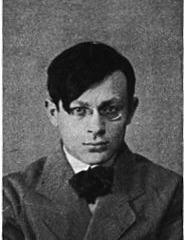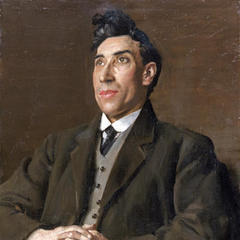John Milton Quotes - Page 11
'Samson Agonistes' (1671) l. 1721
Her virtue and the conscience of her worth, That would be woo'd, and not unsought be won.
John Milton, Henry John Todd (1852). “The Poetical Works of John Milton: With Notes of Various Authors; and with Some Account of the Life and Writings of Milton, Derived Principally from Original Documents in Her Majesty's State-paper Office”, p.309
John Milton (1871). “The poetical works of John Milton, ed. with a critical memoir by W.M. Rossetti”, p.232
John Milton (1848). “The poetical works of John Milton: With a memoir, and critical remarks on his genius and writings”, p.18
John Milton (2003). “The Major Works”, p.269, Oxford University Press, USA
John Milton (1832). “Paradise Lost. [With a portrait.]”, p.37
But oh! as to embrace me she inclin'd, I wak'd, she fled, and day brought back my night.
John Milton (1824). “The Poetical Works of John Milton: With Notes of Various Authors, Principally from the Editions of Thomas Newton, Charles Dunster and Thomas Warton ; to which is Prefixed Newton's Life of Milton”, p.216
Darkness now rose, as daylight sunk, and brought in low'ring Night her shadowy offspring.
John Milton, Thomas Newton (1809). “The poetical works of John Milton: from the text of Doctor Newton with the life of the author”, p.325
A shout that tore hell's concave, and beyond / Frightened the reign of Chaos and old Night.
John Milton (1903*). “Poetical Works”
Come knit hands, and beat the ground in a light fantastic round
Comus l. 143 (1637)
"How soon hath time" l. 1 (1645)
God has set labor and rest, as day and night to men successive.
John Milton (1779). “Paradise lost, a poem in twelve books: in two volumes”, p.192
Hail, wedded love, mysterious law; true source of human happiness.
'Paradise Lost' (1667) bk. 4, l. 750
The oracles are dumb, No voice or hideous hum Runs thro' the arched roof in words deceiving.
John Milton (1804). “Poetical Works: To which is Prefixed the Life of the Author”, p.166
What reinforcement we may gain from hope; If not, what resolution from despair.
'Paradise Lost' (1667) bk. 1, l. 190
'The Reason of Church Government' (1642) bk. 2, introduction
John Milton (1859). “The prose works of John Milton”, p.167
John Milton, Elijah Fenton (1831). “Paradise lost : a poem in twelve books”, p.99
John Milton (1847). “The Poetical Works, of John Milton: With a Memoir and Seven Embellishments”, p.171
John Milton (1873). “The third (fourth, fifth) book of Milton's Paradise lost: with a prose tr. and notes, by J. Hunter”, p.51
John Milton (1773). “The First Six Books of Milton's Paradise Lost: Rendered Into Grammatical Construction ... with Notes Grammatical, Geographical, Historical, Critical, and Explanatory. To which are Prefixed Remarks on Ellipsis and Transposition ...”, p.241







